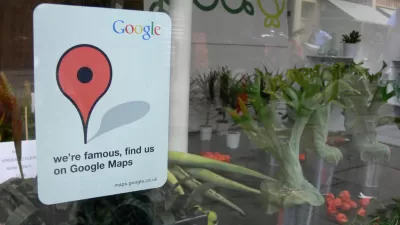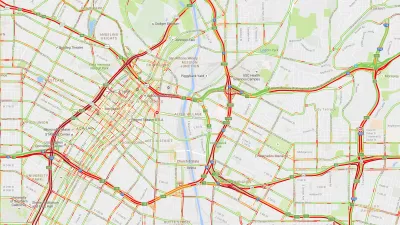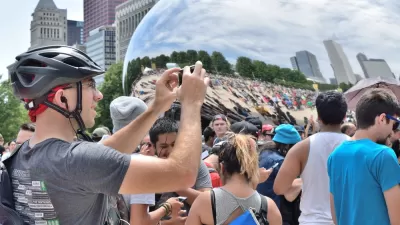All historic maps are welcome in Google's open source machine learning project.

A retrospective mapping project called “rǝ,” led by Google's Raimondas Kiveris, uses historical fire insurance maps as the primary information source for a machine learning venture that aims to map cities as they existed in the past.
"With a slider to control the year, the map displays a historically accurate representation of development in almost any U.S. city dating back to 1800. Automatically generated 3D models of buildings rise from the landscape as the slider moves forward through time," writes Nate Berg.
The open-source map also includes a low-res Google Street View rendering that shows users roughly what a city may have looked like in a given year in the past.
Amateur cartographers and other map enthusiasts can contribute their own historical maps to the open source project. "It can even integrate photographs of buildings, using deep learning to analyze images and augment the blocky 3D models with architectural details," notes Berg.
Kiveris's team anticipates that the map will eventually contain enough visual data to render accurate, lifelike representations of neighborhoods. Kiveris says the renderings could even be used in video games or movies within five years.
That level of detail will require a lot more information, from a wider pool of contributors. “Where we think we really could get good coverage is, for instance, you going to your parents or grandparents and digging through shoeboxes and finding photos,” he says. With good photographs along with known dates and locations, the model can create 3D versions of buildings in a matter of days.
Kiveris is hoping the map will eventually be able to model even more detail, such as the interiors of spaces. “What was inside the building in the 1920s, what did the kitchen look like in the 1940s,” he says. “It becomes a compendium of everyday, mundane life.”
According to Kiveris, the project will preserve the history of buildings regardless of their historical status or widespread cultural significance.
FULL STORY: This incredible Google experiment lets you time travel to your hometown 200 years ago

Trump Administration Could Effectively End Housing Voucher Program
Federal officials are eyeing major cuts to the Section 8 program that helps millions of low-income households pay rent.

Planetizen Federal Action Tracker
A weekly monitor of how Trump’s orders and actions are impacting planners and planning in America.

Ken Jennings Launches Transit Web Series
The Jeopardy champ wants you to ride public transit.

Crime Continues to Drop on Philly, San Francisco Transit Systems
SEPTA and BART both saw significant declines in violent crime in the first quarter of 2025.

How South LA Green Spaces Power Community Health and Hope
Green spaces like South L.A. Wetlands Park are helping South Los Angeles residents promote healthy lifestyles, build community, and advocate for improvements that reflect local needs in historically underserved neighborhoods.

Sacramento Plans ‘Quick-Build’ Road Safety Projects
The city wants to accelerate small-scale safety improvements that use low-cost equipment to make an impact at dangerous intersections.
Urban Design for Planners 1: Software Tools
This six-course series explores essential urban design concepts using open source software and equips planners with the tools they need to participate fully in the urban design process.
Planning for Universal Design
Learn the tools for implementing Universal Design in planning regulations.
Heyer Gruel & Associates PA
Ada County Highway District
Institute for Housing and Urban Development Studies (IHS)
City of Grandview
Harvard GSD Executive Education
Toledo-Lucas County Plan Commissions
Salt Lake City
NYU Wagner Graduate School of Public Service




























